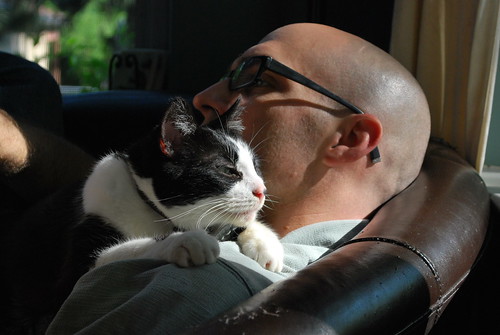
{Photo by rocketlass.}
I've spent the past couple of weekends binging on Don Winslow novels, racing through The Dawn Patrol, The Death and Life of Bobby Z, Savages, The Kings of Cool, and The Winter of Frankie Machine. In case you can't tell by the length of that list, I'm impressed: Winslow writes irresistible crime novels--fast-paced, smart, full of interesting, memorable characters and written with a wry humor in punchy, slang-filled sentences that he obviously had fun crafting. In addition, the southern California setting, centered around San Diego but running along the coast from Mexico to LA, is handled well. It's long been a truism that crime fiction needs to be rooted in a distinct locale, and while there are plenty of examples to the contrary (the Parker novels, for one), Winslow's books are a good reminder of what a well-described and fully understood setting can do: without being heavy-handed, each novel paints a bit more of the picture of SoCal crime past and present, high and low, secret and sanctioned, and taken together the panorama is richly peopled, extensive, and convincing. Though I'll probably bring my actual binge to a deliberate halt soon--all things in moderation, as Aristotle said, including all things in moderation--I'm glad that a bunch more Winslows will be waiting for me when I'm ready to return to him.
Two bits from The Winter of Frankie Machine, which I finished today, got me thinking and seemed worth sharing. The first comes when the Frankie of the title, a retired hit man, realizes he's in danger and has to run. He heads to an apartment he's kept as a bolt hole, and there he opens a safe that's in the closet:
Inside the safe is his "parachute pack"--an Arizona driver's license, an American Express Gold card and a Visa Gold card, all under the name Jerry Sabellico. Every month or so, he makes a phone purchase with the cards to keep them current, and pays them with checks from his Sabellico account. There's also ten thousand in cash in used, mixed bills.When I was a teenager and just getting into crime fiction, this was the sort of thing that would absolutely thrill me: it's like getting secret instructions for how to live life as a badass--just in case. Of course when you're an adult you should have a bolt hole, and of course it should have all those things in it.
And a new, clean, .38 Smith & Wesson with extra ammunition.
Then you grow up, and you realize how glad you are that--no real surprise, let's be honest--you didn't end up living the kind of life that might require a quick getaway. Instead, you're living a life bound up in routine--which Winslow also addresses:
All Frank's days are busy, what with four businesses, an ex-wife, and a girlfriend to manage. The key to pulling it off is to stick to a routine, or at least try to.In some ways, though, even the routine as presented by crime novels is seductive: how many of us have actual routines that don't involve simply going to the office at roughly the same time every day? How many of us surf every morning then hit the same diner for breakfast? The detective (or the criminal, reformed or otherwise) chooses his routine rather than letting it bind him. Like the unchanging patterns of life at Nero Wolfe's brownstone, it's the comforting structure that we're supposed to fall for as readers, so that when the "stuff that comes up" happens, the disruption feels real and we're ready to go along for the ride.
He has tried--without conspicuous success--to explain this simple management technique to the kid Abe. "If you have a routine," he has lectured, "you can always deviate from it if something comes up. But if you don't have a routine, then everything is stuff that comes up. Get it?"
Rather than a routine, what I have these days is a bunch of specific things I want to do each day. When I was a student, and then a young bookseller, I budgeted every week to the dollar (or, when I was selling books in the UK, to the pound). These days, I budget time to the hour instead, plotting days in advance when I'll make the space for running, for the piano, for writing. Habits rather than actual routine rule my days, the difference being that habits are easily rearranged, re-sorted--and few blocks of time fail to be earmarked in advance.
I think it's a good sign that such a situation doesn't even begin to make me long for a bolt hole, a parachute pack, or the sort of life where those are needed. It does, however, make me grateful for the occasional weekend that offers some wide open spaces for doing little but reading crime novels--and even more for a weekend when that reading turns out so well.
Does Winslow at least give a nod in the acknowledgments to Nelson Algren? With his protagonist's nickname, Winslow is really treading on sacred ground.
ReplyDeleteIt comes up explicitly in the text, when Frankie first receives his nickname. (His actual name is Macchiano). He pauses and asks about Algren and Sinatra.
ReplyDelete